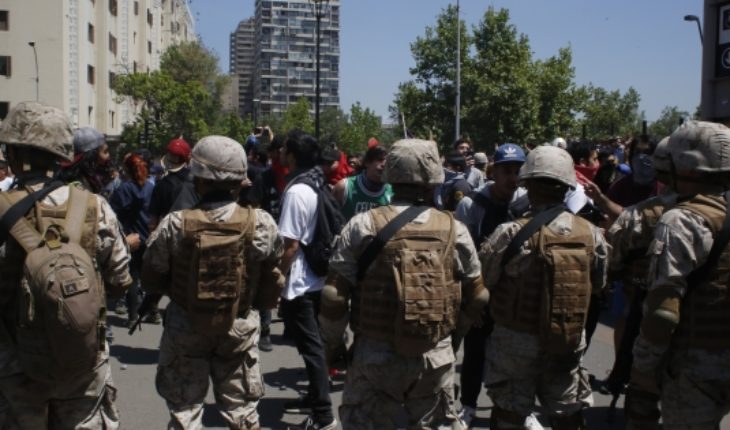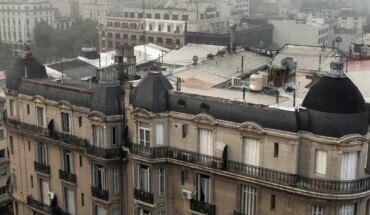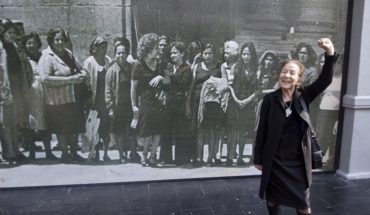2019 will be to not forget. The last quarter almost changes the way we walk all Chileans and the same also applies to the Armed Forces, those who are who they are, are directly or indirectly affected by everything that happens in Chile, or what they do for Chile, as is to contribute to make homeland in the most remote places of our geography. There is no more real evidence than the deaths of the 32 airmen and 3 servicemen, accompanied by 3 civilians who were going to perform professional work, who gave their lives in the sinister Hercules when they fell into the Drake Sea when they were going to work in Chilean Antarctica. For them our tribute and admiration, and for their families all our love and gratitude. What a tragic and terrible way to end the year, and considering this accident as one of the events that significantly affect armed institutes, I invite you to summarize 2019 from the perspective of an external observer looking at the Defense institutions and how they went twelve months of the year for them:
They set off by putting out fires and everything indicates that they are going to end 2019 doing the same thing. Like it or not, this multipurpose capability seems to remain unless the strategy of this government and those who continue to change on how to deal with the effects of climate change, and that it is not future based on the use of military forest brigades, Marines, or the use of marine exploration aircraft or FACH drones. These same multipurpose capabilities are what the government of President Piñera is using to support the work of the police men in the shelter of the northern border resulting from organized and transnational crime that operates in that area taking advantage of the extent and complexity involved in monitoring and detecting those who seek to profit from how inhospitable those territories are.
They set out within the institutions best evaluated according to Cadem and are ending the year in the same condition. Yes, the scores as a result of what happened in the months after 9/18 impacted them, but they did not affect their very good relative positions. This gives to think and even more, it suggests that it is the last ones on the list that are leading the efforts to diminish or neutralize them. The armed forces are of all Chileans and historical experience indicates that they should be prevented from being used or captured by different stakeholders.
The army departed with legal problems affecting both service and retirement officers and all indications that Judge Rutheford will continue to prosecute generals and colonels, as it has not validated the legal position of the army indicating that those who traveled were complying with an in-force procedure. The military has already corrected much of its administrative and control processes, and even implemented a crime prevention model of the kind required of private enterprise, and made a proposal to modify its corporate governance that aims to improve its control and auditcapacity, but unfortunately its most recent past does not allow it to concentrate on the army of the future.
2019 was the year that the underlying issues of National Defense would be worked on and, to tell the truth, we were on the right track until the 18-O appeared to us and, rightly, we changed the priorities. This is why topics such as defence policy and associated issues are such as the definition of traditional and modern threats from which we must protect ourselves and national interests that we are interested in safeguarding, whether territorial or maritime; funding and budget; career and cost of forecasting; cultural aspects of women’s incorporation; improvement of management and internal control systems and procedures, and a subject not minor and already identified previously, the need to have good intelligence, since, without it, all of the above can be worth nothing. The latter includes the funding that intelligence and counterintelligence activities require to operate properly, and which, by their nature, are evidently reserved.
18-0 and what has happened in subsequent months deserves a separate chapter. Not only did I place the military in the role of protagonists by having to go in support of the cops who were overwhelmed by the level and intensity of the violence, but it demonstrated the complete absence and inoperability of the national intelligence system, in what would perhaps be our equivalent to the failures demonstrated by the United States of America in the attack on Pearl Harbor or the attack they suffered on September 11, 2001, in New York and Washington. This makes rethinking whether we want to use the institutions as insurance in the event of police failures, and if we wanted and all to agree, how and circumstances we would do so. What is clear is that taking them out on the street is not chacota and that it has to be accompanied by clear objectives and rules of use of force that are not inorrating or that put at risk the tasks assigned to them. In this sense, their use to protect critical infrastructure may be a good idea, but as long as it is accompanied by the appropriate powers to carry out the mission assigned to them.
You have to be careful about the issue of polyvalence. Much versatility can be efficient from the perspective of using resources, but logic indicates that too much of it may mean ineffectiveness, as they can do many things, but none of them can do well. We must not forget that the armed forces are tasked with defending sovereignty and protecting national interests, whether the latter, inter alia, maritime (exclusive economic zones and foreign trade), air (passenger transport and air cargo) or land (borders). Continuing to add mission areas doesn’t seem to be a good idea, and if new needs appear to meet, I recommend that existing ones be subtracted and that something is stopped, but increasing them can only be bread for today and hunger for tomorrow.
Why is it necessary for the national intelligence system to work and for the definition of what the armed forces are doing and to what they are in to exist and have been thought of before? It is because the world has become more complex and the threats more diffuse and difficult to predict. This forces us to be very attentive and with capabilities that ideally allow us to anticipate and/ or react adequately among other things to cyberattacks, disinformation and destabilization actions, joint actions of subversive and organized crime groups that may or may not be supported from abroad, effects of climate change on the human population such as droughts and forest fires, predation of marine resources and efforts of third parties that seek to affect maritime transport and operation ports, applying the same to air traffic and airports. We could continue with many other examples of non-traditional threats that now accompany the classics that have not, by the way, disappeared and that compel us to take national defense and security seriously because what is at risk at the end of the day is the ability to be sovereign, independent, and with the possibility of living in democracy.
We are not going to draw anything if we do not understand national security as a concept that encompasses not only defence against external threats, but as one that includes the public and internal order of the republic, a harmonious and inclusive economic development that allows a nation with social cohesion and with a common understanding of what we want to be and how we want to become. The 18-O gave us a lesson in that regard and we should not stumble upon the same stone twice if we want to become a prosperous, developed, inclusive nation where all Chileans feel that they have a space and something to contribute. The best national security we can have is a Chile where there are 17 million happy and happy people who are concerned about having a safe and prosperous Chile.
To shape all of the above will require armed institutions, police and intelligence that are not only effective, but also efficient and well managed, since otherwise their effectiveness can be put at risk product if they are not efficient and if they are not perceived as ethical and integrated. In this sense we must not abandon the efforts that have been made in this matter and it is not more necessary to be papists than the Pope.
Before I finish, I would like to mention one of the great challenges we have in defence, and that is why I am referring to the participation of civil society in the issues of national security and defence. Chile’s security and defense is not only the responsibility of the President of the Republic, the Minister of Defense and the commanders-in-chief of the armed institutes. It is of all Chileans and a product of it, and with the same enthusiasm that we are involved in education, health and social welfare, we must be interested in these subjects, because as they will have noticed, the world is no longer so safe and quiet. By interest I mean that civilians are prepared in the castrens and that they cease to be a monopoly of the armed forces. If this does not happen, then then we do not claim or indicate that they are sent alone or that no one understands them. Institutions are preparing to work with civilians and I would hope that the opposite would happen as well.
I end up again doing a reconnaissance to the 38 who fell into the Drake Sea making a homeland, and I hope that their families are well accompanied on these dates by all Chileans, as they and no one else are living in their own flesh which means that a loved one has given his life for Chile.
The content poured into this opinion column is the sole responsibility of its author, and does not necessarily reflect the editorial line or position of El Mostrador.





